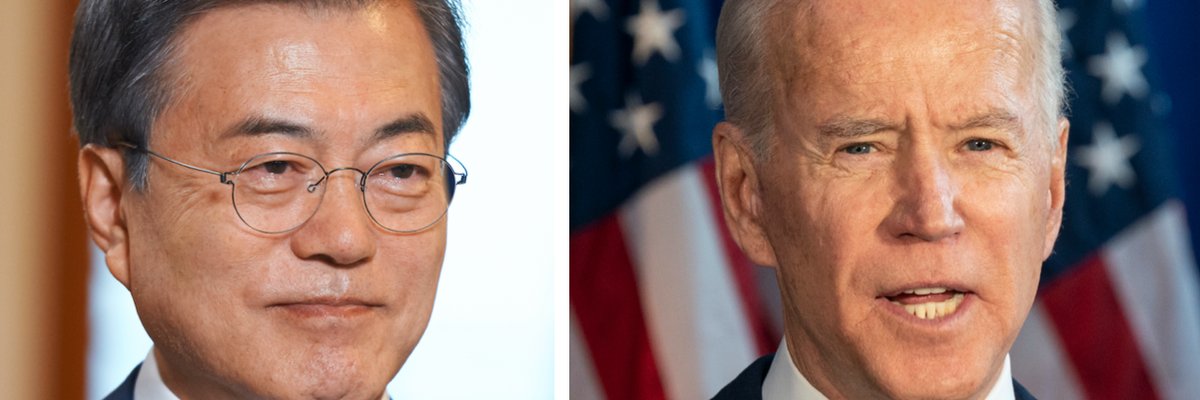The upcoming summit between President Joe Biden and South Korean President Moon Jae-in in Washington presents a major opportunity to demonstrate a shared understanding of a path forward on North Korea, one that reduces the possibility of renewed conflict on the Korean Peninsula involving the U.S. military.
The fact that President Moon is visiting Washington so early in Biden’s presidency is a positive sign for the state of the “ironclad alliance.” Indeed, this is only the second in-person head of state meeting for President Biden, and South Korea’s early appearance reinforces its importance to the United States as a critical ally and partner not just in the Indo-Pacific but globally. But high-level meetings beget high expectations.
The Biden-Moon summit comes at a politically sensitive time for the White House. Violence in the Middle East is pitting the Biden administration against progressives in Congress in a highly public way. At the same time, Congress is rushing to legislate a massive China bill that, if passed and implemented, would lock the two largest economies into a de facto cold war. And President Biden’s admirable decision to withdraw all troops from Afghanistan by September 2021 has caused grumbling within certain corners of the foreign policy establishment.
On North Korea, Biden has thus far provided little detail about his views beyond his abrupt, single word answer describing it as his top foreign policy priority. Biden has remained silent on the issue, even after the North Korea policy review ended on April 30. He has also yet to appoint a special envoy to handle North Korea policy (a role held by Stephen Biegun in the previous administration), leaving the impression that North Korea may not be a high priority for him compared to other countries such as Iran, for which he already appointed a special envoy.
Fortunately, President Biden can use the upcoming summit to clarify his vision on the Korean Peninsula. Specifically, Biden should explain in concrete terms a roadmap for a peaceful Korean Peninsula, one that protects U.S. interests in a stable region as well as serves the interest of its close South Korean ally.
Until now, the White House has been vague, even contradictory, when it comes to its strategy for restarting talks with North Korea. For example, it was reported that Biden will build upon the Singapore Declaration, while at the same time maintain maximum sanctions against North Korea. Secretary of State Tony Blinken has indicated his desire to “work together with the ROK and other allies and partners, including Japan, toward denuclearization of the DPRK,” while also pledging to emphasize “human rights and democracy,” despite the latter’s likelihood to push North Koreans away from the negotiating table. Of course, there are legitimate concerns about the North Korean regime’s grave human rights abuses and self-imposed isolation that hinder dialogue, both physically in terms of border closures in response to COVID-19 as well as figuratively as seen by its decision to demolish the inter-Korean office in the border town of Kaesong. But these are reasons for more dialogue, not less.
Currently, there exists a complex web of U.S. laws and executive orders, as well as UN Security Council resolutions, that prohibit numerous aspects of U.S. engagement with North Korea. Some also seek to make sanctions a near-permanent tool of statecraft short of drastic changes in North Korea’s human rights record, nuclear arsenal, and other goals that economic sanctions have yet to induce. The net effect: U.S. relations with North Korea remain frozen in time, never allowed to evolve unless Pyongyang takes certain major steps it is highly unlikely to take early on in any negotiation.
Ultimately, the strength of the U.S.-South Korea alliance lies not in how much they agree with each other but in their resolve to stick together in the face of disagreements. The Moon administration has made explicit its desire for a war-free Korean Peninsula and called on Biden to pursue dialogue with North Korea. Biden should be equally clear about his vision and present a realistic strategy for achieving it.
At a time of unprecedented domestic challenges, avoiding conflict seems like a no brainer. Some American advocacy groups and think tanks, including the Quincy Institute, have called for a more proactive approach toward the twin goals of U.S.-North Korea political reconciliation and the denuclearization of the Korean Peninsula. Today, Rep. Brad Sherman introduced legislation that calls for a permanent peace agreement, liaison offices between Washington and Pyongyang, and a review of current restrictions that prohibit most Americans from traveling to North Korea. There are other proposals that seek to bridge the gulf between U.S. aspirations and reality when it comes to curbing North Korea’s destabilizing actions. If there is a more sensible path forward, President Biden should make that case on Friday.
















